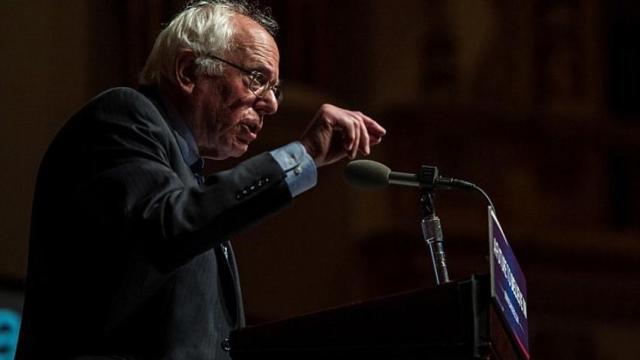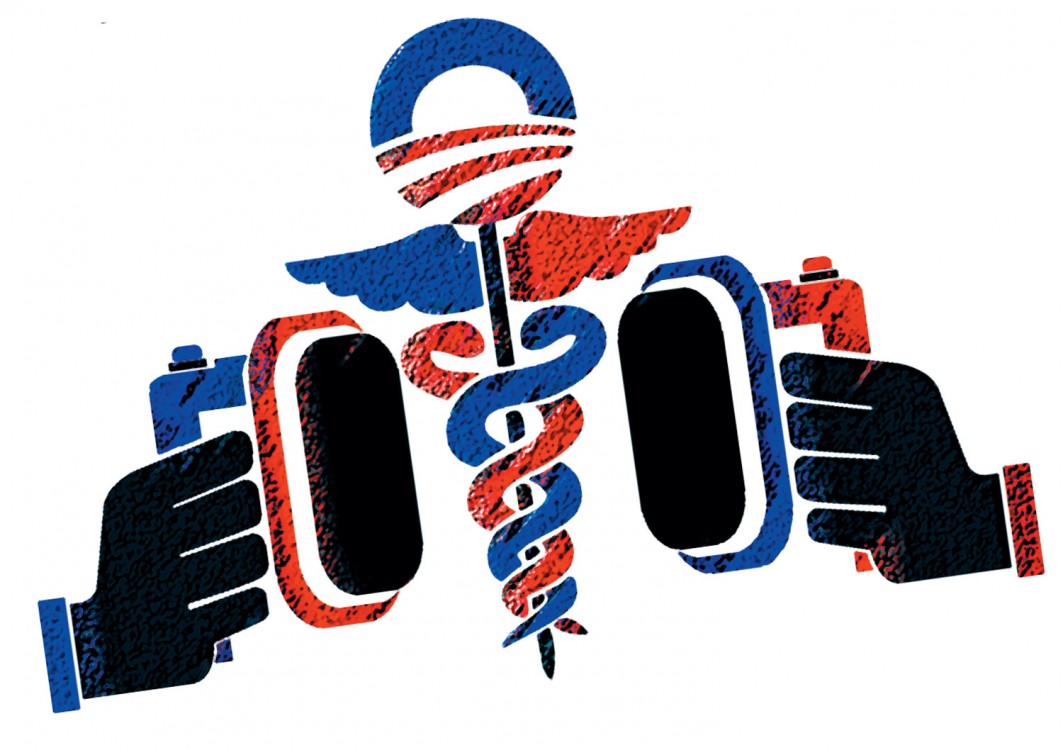
The passage of the Affordable Care Act, a.k.a. Obamacare, shows what it takes to create a new government benefit in 21st-century America. The debate over the bill during Obama's first term was a nationwide shoutfest that turned violent at times; since Obamacare became law in 2010, the Republican-controlled House has continuously voted to defund it, conservatives have challenged it in multiple court battles (at least one of which is still being fought), many GOP-run states have stalled the expansion of Medicaid that was supposed to come with the law, and every Republican candidate for president has promised to make repealing Obamacare a priority.
So it's no surprise that Republicans really, really hate the ACA, and most polls over the years have shown that more Americans disapprove of Obamacare than approve of it. But according to a new survey from Gallup, what they want to replace it with is the sort of socialist-style system Bernie Sanders and others have been backing for years.
In Gallup's poll, Democrat-leaning voters mostly supported Obamacare, but 72 percent of all respondents who approve of it said they'd like to replace it with a "federally funded healthcare program providing insurance for all Americans," or what's commonly known as a "single-payer" system. And even 41 percent of Republican-leaning respondents, who mostly dislike the ACA, told Gallup they'd rather have single-payer than Obamacare—a position that, as far as I can figure out, not a single Republican officeholder has ever endorsed. But if socialized medicine is actually so popular, why can't we have it? In other words, why has the healthcare debate been so out of touch with what people say they want?
Health insurance is a fairly complicated topic, and not top-of-mind for most voters during a campaign cycle that has focused on the economy and immigration. According to recent Pew polls, Republicans generally don't think the government should get involved in healthcare. But there's a not-insignificant amount of evidence that when you strip out the names of parties and candidates, support for government-run insurance cuts across partisan lines. The new Gallup poll, notably, didn't remind participants that federal health insurance was opposed by the right; one 2015 Huffington Post/YouGov poll found that if you told people single-payer was Donald Trump's idea a lot more Republicans were suddenly on board (and a lot more Democrats suddenly opposed universal healthcare).
Opposition to Obamacare is often synonymous with the right-wing effort to block the expansion of the federal government into citizens' lives. On the angrier corners of the fringe, this means Sarah Palin–esque denouncements of rationing care and "death panels," but more respectable right-wingers will tell you that the problem is the government shouldn't be able to force you to buy something you don't want to. An anti-ACA lawyer even admitted, during the famous 2012 Supreme Court battle over the law, that a single-payer program would be more constitutional than the current method of requiring people to become private health insurance customers or face tax penalties.
Less talked about is the significant number of people who thought that Obamacare didn't go far enough. Sanders has been the most prominent supporter of a government-run system since he introduced an obviously doomed amendment to adopt single-payer during the original ACA debate in the Senate. Beyond single-payer, though, there's something called the "public option," a scheme that would give people the choice of buying government-provided insurance or going to the private market.
Back in 2009, many assumed that letting the government compete with private companies would eventually destroy the insurance industry. The public option, supported by many Democrats but opposed by the right and the healthcare companies themselves, became such a contentious topic the Obama administration never really pushed for it.
The thing is, a lot of regular people, who, unlike politicians, never get any lobbyist money from the health insurance industry, apparently wouldn't mind if that industry was destroyed. The public option was popular before Obamacare became law, and it's remained popular, as has single-payer. Dealing with insurance companies can be a bureaucratic nightmare; the ACA is complicated and a lot of people never understood it. Is it any wonder that many wouldn't mind if all that garbage were swept to one side and all you had to do was fill out a form with your taxes, and: blammo! You get health insurance?
The populist appeal of government-provided insurance is obvious enough that Trump, in one of his many breaks from Republican orthodoxy, once told "60 Minutes" that "everybody's got to be covered" and that "the government's gonna pay for it." His apparent off-the-cuff support for something like single-payer drew howls of protest from the right, though, and his current healthcare reform plan is basically in line with other GOP ideas. Perhaps its most important element is giving state governments more autonomy in administering Medicaid—which might lead to fewer poor people being insured, the opposite of "everybody's got to be covered."
The original ACA debate was incredibly frustrating for liberals, who saw their high-minded, far-reaching plans to expand and fix the US healthcare system set back by a vicious right-wing misinformation campaign and the deep pockets of the health insurance industry. Sanders's campaign is the agonizing sequel: He's been preaching about single-payer for years, and, like many of his proposals, including tuition-free college, voters like it. Even some Republican voters like it, provided it's not framed as an insidious government takeover of the private sphere.
But barring a miracle, Sanders won't be coming near the White House. That leaves us with a choice between Trump's burn-Obamacare-to-the-ground "reforms" and Hillary Clinton's incrementalism (she wants to let more people into Medicare, a step leftward for sure, but a baby step).
There are signs that America could be inching toward a government-run healthcare system—it's possible that the state of Colorado will experiment with something like single-payer after November's vote. And polls like Gallup's show that people don't hate the idea, even if one of the country's political parties does. But progress, as usual, is pretty fucking slow, and getting to actual universal healthcare is going to require a fight at least as intense as the one over Obamacare.
3 WAYS TO SHOW YOUR SUPPORT
- Log in to post comments













Comments
DH Fabian replied on
Sort of
What today's Americans don't want to do is extend equal, comprehensive health care to our very poor. Deprivation of adequate food and shelter takes a heavy toll on people's health. It wouldn't make sense to bring people back to health, just to dump them back on the streets.
Brian Elwin Pomeroy replied on
Generally the Public
The larger the group the more unorganized or apparently stupid. Compare a small country that limits immigration to a large country melting pot. A more mixed opinion or 'more cooks' to spoil the soup is the LAST thing any country needs. Mostly the large countries in the west. Of course, that's how the man keeps you down. They give you lots of fellow idiots to argue with so as ANY solution you might come up with will be lost in a sea of stupid.